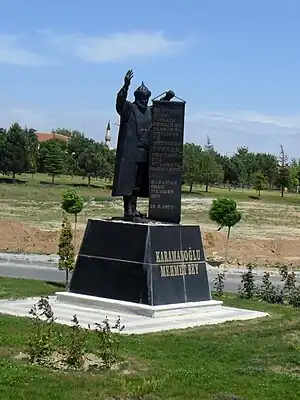| Shams al-Dīn Meḥmed Beg | |
|---|---|
| Beg of Ḳarāmān | |
| Predecessor | Ḳarāmān |
| Successor | Güneri |
| Died | 20 June 1277 or 30 May 1279 |
| House | Ḳarāmān |
| Father | Ḳarāmān |
| Religion | Islam |
Shams al-Dīn Meḥmed I Beg (Turkish: Şemseddin Mehmed Bey; died 20 June 1277 or 30 May 1279) was Beg of Ḳarāmān from 1263 until his death. Ḳarāmān was a Turkish principality in Anatolia in the 13th century. His father was Karaman Bey.
Early life
Meḥmed was the eldest son of Karim al-Dīn Ḳarāmān, the soubashi of the region around Ermenek, Mut, Silifke, Gülnar, and Anamur. Upon Ḳarāmān's death in 1263, Sultan of Rum Kilij Arslan IV arrested his children and brother, emir-i jandar Bunsuz. When Kilij Arslan died in 1266 and Muʿīn al-Dīn Parwāna assumed full power, the latter released Ḳarāmān's children, except for ʿAlī, who was kept in Kayseri.[1]
Reign
Meḥmed and his brothers joined Hatīroghlu Sharaf al-Dīn's revolt against the Mongols. Sharaf al-Dīn granted Meḥmed the lands his father Ḳarāmān formerly ruled over and dismissed Badr al-Dīn Ibrāhīm from that position. Meḥmed further expanded his territory towards the Mediterranean coast and eliminated the Mongol force of 200 men in Ulukışla. When Sharaf al-Dīn was killed by the Mongols in 1276, Badr al-Dīn attempted to take revenge on Meḥmed but was defeated by him in Göksu Valley.[1]
Next year he allied himself with Baybars of Mamluks. In May he captured Konya, the Seljuk capital. But instead of declaring himself as the sultan he supported his puppet Jimri as sultan, and in turn Jimri appointed him as vizier of the Seljuks on 12 May 1277.[2] As vizier Mehmet issued his famous firman (decree) ordering the Turkish language to be used instead of Persian and Arabic in government offices. But his service term in Konya lasted only about a month. Hearing news of the approaching Mongol army, both Mehmet and Jimri fled from Konya.[3] But the Mongols chased him, and during a clash in Mut Mehmet and his two sons were executed in August 1277.[4] He was succeeded by his brother Güneri.
Firman
Mehmet is known as a devotee of the Turkish language. During his brief term as a vizier, he issued a firman dated 13 May 1277:
Legacy
The university of Karaman city is named after him.[2](see Karamanoğlu Mehmetbey University)

See also
References
- 1 2 Sümer 2003, p. 445.
- 1 2 Karamanoğlu Mehmetbey University page (in Turkish)
- ↑ Prof. Yaşar Yüce-Prof. Ali Sevim: Türkiye tarihi Cilt I, AKDTYKTTK Yayınları, İstanbul, 1991 p 242-243
- ↑ Clause Cahen:Pre Ottoman Turkey (trans by J.Jones-Williams), Taplinger Publishing Co.,Library of Congress:6824744 and , New York, p.292
- ↑ Culture and Tourism Ministry Karaman page (in Turkish) Archived August 11, 2014, at the Wayback Machine
Bibliography
- Sümer, Faruk (1978). "Ḳarāmān-Og̲h̲ullari̊". In van Donzel, E.; Lewis, B.; Pellat, Ch. & Bosworth, C. E. (eds.). Encyclopaedia of Islam. Volume IV: Iran–Kha (2nd ed.). Leiden: E. J. Brill. OCLC 758278456.
- Sümer, Faruk (2003). "Mehmed Bey, Karamanoğlu". TDV Encyclopedia of Islam, Vol. 28 (Mani̇sa Mevlevîhânesi̇ – Meks) (in Turkish). Istanbul: Turkiye Diyanet Foundation, Centre for Islamic Studies. pp. 445–446. ISBN 978-975-389-414-2.